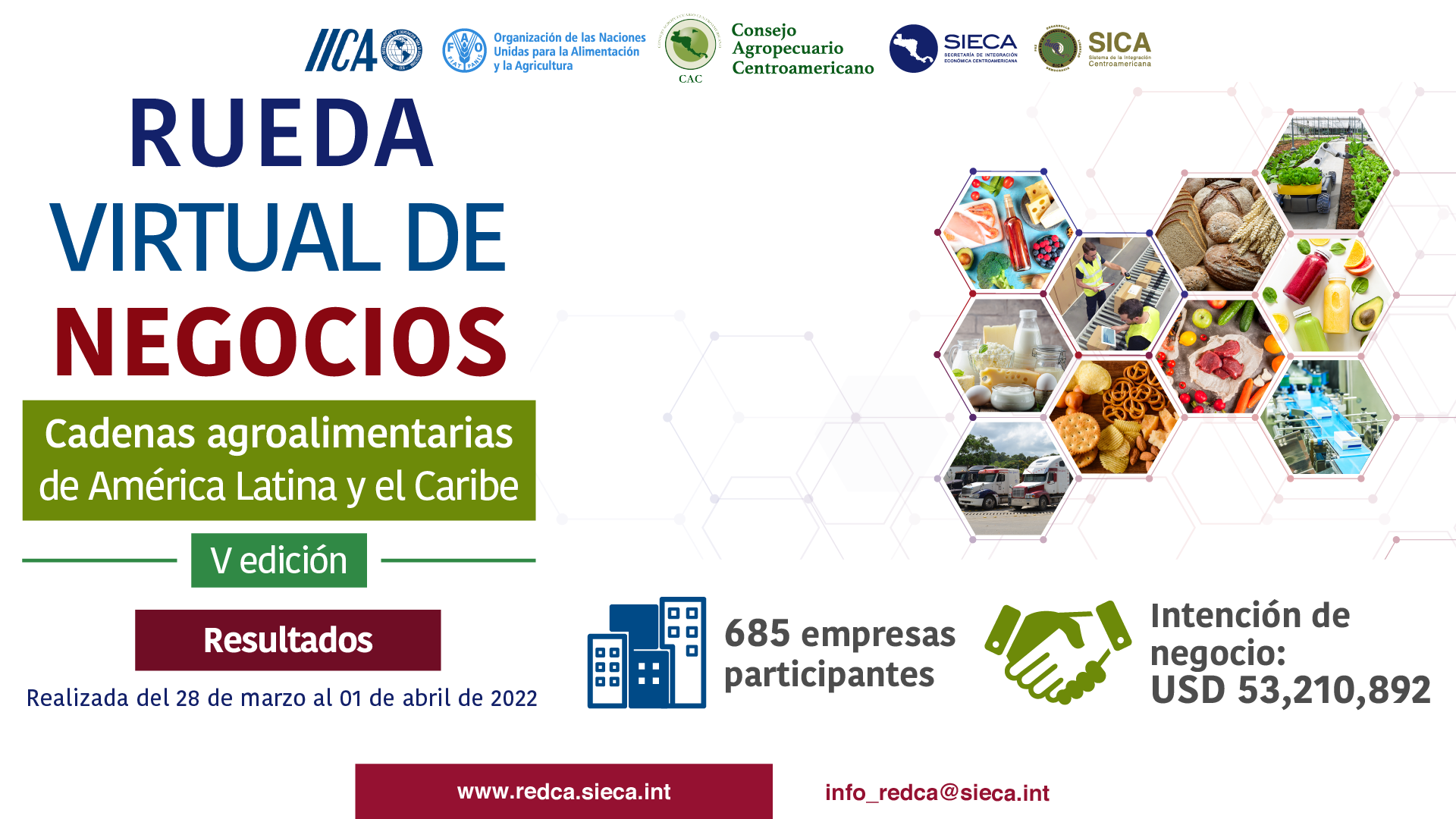The trading session sought to support businesses in consolidating and diversifying their export markets, in a global context impacted by Covid-19 restrictions, a logistics crisis and the conflict in Eastern Europe.

San José, 20 April 2022 (IICA) — A total of 685 companies participated in the fifth edition of the Virtual Business Roundtable of the Agrifood Chains of Latin America and the Caribbean, organized by the SICA Region to promote commercial ties and networks between sector companies, in a meeting that generated commercial intentions in the amount of $53 million.
The roundtable also aimed to support companies in consolidating and diversifying their export markets, in a global context impacted by Covid-19 restrictions, a crisis in the logistics sector and volatile international markets as a result of the conflict in Eastern Europe.
Companies from Costa Rica, Guatemala, El Salvador, Honduras, Nicaragua, Panama and the Dominican Republic participated in the event, where they were joined by buying and selling companies from Argentina, Bolivia, Brazil, Chile, Colombia, Dominica, Ecuador, Mexico, Paraguay, Peru, Saint Lucia, Trinidad and Tobago, the Dominican Republic, Uruguay and Venezuela, as well as importers from China and the USA.
The virtual business roundtable was held on the Central American Trade Network (REDCA) platform and was organized by the Secretariat for Central American Economic Integration (SIECA), in collaboration with the Inter-American Institute for Cooperation on Agriculture (IICA), the Food and Agriculture Organization of the United Nations (FAO) and the Executive Secretariat of the Central American Agricultural Council (SECAC).
The virtual business roundtable promoted the sale of the following products and services of the agrifood sector: primary products and by-products, transformed foods, natural cotton fibers, production support services and marketing services.
The subsectors with the greatest number of companies were fruits, vegetables, coffee, cocoa, basic grains, seeds, food preparations, healthy snacks, packaging and distribution services, transport and logistics.
Desiree García, Director of the Center of Studies on Economic Integration (CEIE) said, “The virtual business roundtable that the SIECA organized with IICA, the FAO and the SECAC allowed companies from Latin America and the Caribbean to meet with potential strategic partners, clients and suppliers through virtual meetings held over the REDCA, which is the smart commercial platform that the institution provides for the private sector to generate business networks that encourage trade exchanges”.
Oswaldo Segura, SECAC Trade and Competitiveness Specialist, commented that, “in 2022, agriculture in the SICA Region is experiencing a very complex context of war, pandemic, a logistics crisis, food security risks, climate change and price increases for inputs and cereals. Initiatives like business roundtables have proven to be a very useful and accessible tool for generating business for farmers in the region. This success is boosted by the collaborative work of the different organizations: SIECA, FAO, IICA and SECAC”.
Daniel Rodríguez, IICA International Trade and Regional Integration Program Manager, referred to the difficult context created by the current international situation, and stressed the importance of strengthening trade and regional integration in the present context.
“The effects of Covid-19, adverse climate conditions that various countries in the region are facing, and the conflict in Eastern Europe represent major shocks to regional and global agrifood systems. Strengthening regional integration has become a key element, not only because it facilitates a greater supply of foods and inputs from nearby countries, minimizing food security risks, but also because it benefits production chains that promote economic and social development. In this context, the virtual business roundtables organized by IICA, SIECA, FAO and SECAC have positioned themselves as a meeting point that brings commercial ties closer together among the countries of Latin America and the Caribbean”.
Along the same lines, Pablo Rabczuk, Trade and Food Systems Officer of the FAO Office for Mesoamerica, said “the last FAO Regional Conference—LARC37 authorized supporting member countries to develop supply chains and food trade with an emphasis on the promotion of SMEs and family farming organizations in regional markets and in international trade, to contribute to food and nutritional security throughout the region. Spaces that generate opportunities, such as the virtual business roundtables organized by FAO, IICA, SIECA and SECAC, have become useful and timely tools for companies and farmers in the region to link up in chains and access new markets. We hope these initiatives, which contribute directly to regional agrifood trade, will continue to grow and support food security, the development of decent employment and economic recovery in our region”.
Virtual business roundtables are a meeting point that allows companies to make commercial contacts with potential strategic partners, clients and suppliers through virtual meetings. These events are organized by participating companies from any location in the world using a mobile device or computer with an internet connection, and they seek to promote the development of business networks in the agrifood sector of Latin America and the Caribbean, and thus promote intraregional trade and food security.
More information:
Institutional Communication Division
comunicacion.institucional@iica.int











